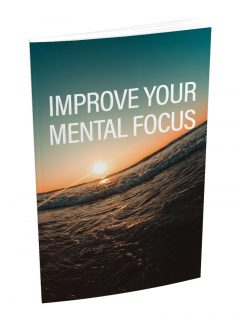 License Type: Master Resell Rights
License Type: Master Resell Rights  File Type: ZIP
File Type: ZIP
 SKU: 64504
SKU: 64504  Shipping: Online Download
Shipping: Online Download
Sample Content Preview
Introduction
Everyone has been there. Your to-do list is a mile long. You sit down to get to work, but your brain just doesn't want to turn on. The more you try to force it, the more your attention wanders.
For some, this is just an every once in a while type problem. For others, it can be an all-day, everyday struggle. The modern world is full of distractions. Even if you love what you do, there is always something more interesting you could be doing with your day. You live in a world where the next notification is just a second or two away. All of your devices are constantly begging for your attention.
So how do you cut through the digital clutter, overlook the flashing lights, and make your brain get to work? Improving your mental focus is as simple as "practice makes perfect." By creating a clear plan and establishing healthy habits, even the most distractable mind can cut through the fog and be productive.
1. Identify Clear Goals
The first step is to identify what you need your focus to be on. When you don't have a clearly defined goal, your mind will wander. Give your attention something to use as an anchor.
Sounds simple, right?. Sometimes defining goals is simple. Report A is due to the boss by 2 pm, which is the morning's only goal. But when you don't have a hard deadline for every item on your mile-long list, defining the goal can get complicated.
Make a process that you can use every day to help keep that to-do list organized.
- First, identify your priorities. Write down that to-do list. Whether it's handwritten or digital, the important thing is seeing everything laid out in front of you.
- Now that you have your priorities straight, put them in order of importance.
Tackle the most urgent ones first. The idea is to get those tasks that are the very highest priorities taken care of before anything else can get the chance to distract you.
- Make sure that everything you add to your to-do list gets separated into small steps. Then set aside small blocks of time to focus only on the specific things on your list. Set a timer if it helps you stay on track.
- Don't overextend yourself. That two-mile-long list of goals for the day isn't helping the matter at all. Long lists don't often get finished. So just put some of those less urgent things on the shelf. You can tackle them another day when they are more pressing.
Overextending yourself or not setting realistic expectations can do real damage to your focus over time. When you set unrealistic goals and then fail to meet them over and over, you are training your brain to expect failure.
Instead of a two-mile-long list, limit yourself to just the highest priority items. Remember that once you get those high priorities done, you can always come back and set a new list of goals.
1. Get Rid of Distractions
Eliminating distractions is a vital part of preparing your mind to be able to focus. Distractions in modern times are complicated and are a large part of the problem. Whether it's the notifications on your phone or something in your office, it can be impossible to pay attention to the task at hand.
So what might be distracting you? To get rid of it, you have to identify what it is.
Physical Distractions
You can easily anticipate and plan for physical distractions in advance. Often it's just a matter of having a consistent daily routine. Take the time to anticipate problems and solve them before they can affect your focus.
- Hunger
Always realizing you are hungry when you are trying to get started? Don't skip breakfast.
Even if you aren't the type to start your day with a meal, you can plan ahead and keep an easy-to-grab snack in your work area. Eat before you try to get started.
- Temperature
When you are too cold or too hot, it quickly becomes challenging to keep your brain focused on a computer screen. Ideally, you can control your environment's temperature and find that sweet temperature spot before it's time to get started. In reality, though, you might not have any control at all. You can still plan ahead.
Work in a chronically cold office environment? Keep a sweater or light jacket on hand to put on when you get a chill. Regularly feel way warmer than your co-workers? Keep a fan at your desk.
- Noise
Noise is another environmental element you might not always be able to control. It could be phones ringing at another desk or annoying music coming through the shared wall. Some individuals are quite easily distracted by any sounds, while others can tune it all out at will.
- License: Master Resell Rights
- Category:Ebooks
- Tags:2022 Ebooks With Audio Master Resale Rights








